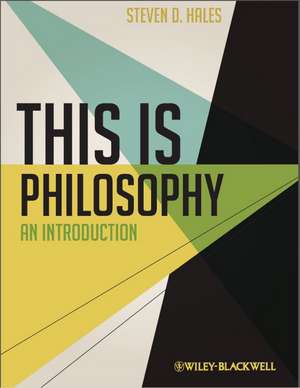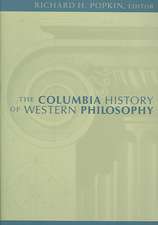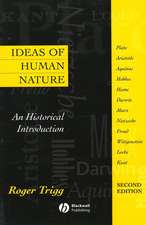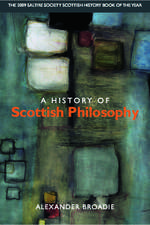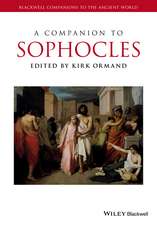This Is Philosophy: An Introduction
Autor Steven D. Halesen Limba Engleză Paperback – 3 ian 2013
- Conveys the excitement and importance of philosophy while explaining difficult concepts clearly for the average undergraduate
- Represents a student–friendly yet knowledgeable guide to the questions, problems, and great thinkers of philosophy
- Extensive online student and instructor resources. Features chapter–by–chapter links to supplemental materials and freely available online primary sources, a glossary, student comprehension self–assessment exercises, and more.
- Instructors can also access a 175–question test bank and answer key, 40 PowerPoint lectures Available at http://www.thisisphilosophy.com/intro–philosophy
Preț: 224.30 lei
Nou
42.92€ • 44.56$ • 35.79£
Carte disponibilă
Livrare economică 03-17 martie
Livrare express 15-21 februarie pentru 24.82 lei
Specificații
ISBN-10: 0470658835
Pagini: 296
Dimensiuni: 155 x 229 x 15 mm
Greutate: 0.39 kg
Ediția:New.
Editura: Wiley
Locul publicării:Hoboken, United States
Public țintă
Undergraduate level students for Introduction to Philosophy courses; general readersDescriere
Understanding philosophical ideas and arguments can be a daunting undertaking but it doesn t have to be. This Is Philosophy: An Introduction offers an engaging introduction to the subject that brings difficult, abstract concepts down to earth in straightforward language. Topics covered include ethics, the existence of God, free will, personal identity, philosophy of mind, epistemology, and more. While covering traditional topics, the discussion is also connected to relevant developments in nearby disciplines, such as how empirical psychology is related to virtue ethics, and neuroscience to philosophy of mind.
The book is enhanced by a wealth of supplementary online materials links to free online primary sources and reference materials, witty takes on philosophical puzzles, and a host of extras on the companion website, including notes on philosophical method, a glossary of terms, an extensive test bank, and more. With examples that are more Dave Matthews Band than Verdi, more beer than Brunello di Montalcino, the great debates of philosophy are made accessible, yet never watered down. This Is Philosophy: An Introduction not only brings philosophy to life it will leave beginning students wanting more.
Textul de pe ultima copertă
Understanding philosophical ideas and arguments can be a daunting undertaking but it doesn t have to be. This Is Philosophy: An Introduction offers an engaging introduction to the subject that brings difficult, abstract concepts down to earth in straightforward language. Topics covered include ethics, the existence of God, free will, personal identity, philosophy of mind, epistemology, and more. While covering traditional topics, the discussion is also connected to relevant developments in nearby disciplines, such as how empirical psychology is related to virtue ethics, and neuroscience to philosophy of mind.
The book is enhanced by a wealth of supplementary online materials links to free online primary sources and reference materials, witty takes on philosophical puzzles, and a host of extras on the companion website, including notes on philosophical method, a glossary of terms, an extensive test bank, and more. With examples that are more Dave Matthews Band than Verdi, more beer than Brunello di Montalcino, the great debates of philosophy are made accessible, yet never watered down. This Is Philosophy: An Introduction not only brings philosophy to life it will leave beginning students wanting more.
Cuprins
How to Use This Book xiii
Preface xv
Acknowledgments xvii
1 Ethics: Preliminary Theories 1
The Normative Universe 1
Is Morality Just Acting on Principles? 3
Divine Command Theory (Is Morality Just What God Tells Me to Do?) 6
Egoism (Is Morality Just My Own Personal Code?) 10
Psychological and ethical egoism 11
Objections to ethical egoism 16
Moral Relativism (Is Morality Just How Society Says We Should Act?) 19
Descriptive and moral relativism 19
Criticism objection 22
Annotated Bibliography 24
Online Resources 25
2 Ethics: The Big Three Theories 27
Utilitarianism (Is Morality Doing What I Can to Make This the Best World Possible?) 27
Consequentialism and hedonism 28
Measuring pains and pleasures 31
Quality and quantity 33
Objections to utilitarianism 37
Deontology, or Kantianism (Is There an Absolute Moral Law?) 42
Imperatives and good motives 43
Categorical imperative (version 1) 44
Categorical imperative (version 2) 47
Objections to deontology 49
Virtue Ethics (Is Morality All about Having a Virtuous Character?) 52
What is virtue? 53
What is character? 54
Objections to virtue ethics 54
Conclusion 60
Annotated Bibliography 60
Online Resources 61
3 God 63
Faith 64
Faith as confi dence 64
Faith as belief without reason 64
The Attributes of God 66
Why There Is a God 67
The argument from scripture 67
The ontological argument 71
The cosmological argument 75
The teleological argument or the argument from design 80
Pascal′s wager 88
Why There Is No God 95
Proving a negative 96
The argument from religious pluralism 97
The problem of evil 99
Conclusion 107
Annotated Bibliography 108
Online Resources 110
4 Freedom 115
Why There Is No Free Will, Part 1: Divine Foreknowledge 116
Presentation of the argument 117
Objection 1: Atheism and agnosticism 117
Objection 2: Aristotle s answer 118
Why There Is No Free Will, Part 2: A Regress of Reasons for Acting 119
Previous decisions vs. outside forces 120
The regress of reasons argument against free will 123
The digger wasp 125
Why There Is No Free Will, Part 3: The Dilemma Argument 126
The threat of determinism 127
Will randomness make us free? 130
The dilemma argument against free will 131
Free will and moral responsibility 132
Agent causation 136
Compatibilism 138
The Feeling of Freedom 141
Conclusion 143
Annotated Bibliography 144
Online Resources 145
5 Self 149
The Problem of Difference and the Problem of Sameness 149
The problem of difference 149
The problem of sameness 150
Preliminary Positions 151
The luz bone 151
Fingerprints 152
DNA 153
The Soul Criterion 153
Conceptions of the soul 153
Objections to the supernatural soul criterion 155
The Physicalist Criterion 160
Abigail the case of ordinary aging 161
Closest physical continuer relation 161
Kenny the case of loss 164
Brain transplants 166
The Psychological Criterion 168
Closest psychological continuer relation 169
The Bundle Theory 178
Split–brain surgery 178
Buddha and Hume 180
The Sex Pistols 182
Conclusion 183
Annotated Bibliography 184
Online Resources 185
6 Mind 189
The Rare and Mysterious Mind 189
First Theory of the Mind: Substance Dualism 190
Physical and mental substances 191
Descartes′s conceivability argument for dualism 191
Objections to substance dualism 193
Second Theory of the Mind: Behaviorism 198
Explanation of the theory 198
Objection: Mental states without behavior 200
Third Theory of the Mind: Mind–Brain Identity Theory 202
Explanation of the theory 202
Objections to the mind–brain identity theory 203
Fourth Theory of the Mind: Functionalism 209
Explanation of the theory 209
Objections to functionalism 211
Conclusion 216
Annotated Bibliography 217
Online Resources 219
7 Knowledge 223
The Value of Truth 223
The rational principle 224
The hedonist s challenge 225
The Value of Evidence 228
Fraud and quackery 229
Ways we can go wrong 231
How Much Evidence Do We Need? 231
Part 1: We need a lot 231
Part 2: Go on, take a chance 234
Sources of Evidence 240
Perception, testimony, memory, reason 240
Empiricism 241
The Nature of Knowledge 243
Analysis of knowledge, first attempt 244
Analysis of knowledge, second attempt 245
The Skeptic′s Challenge 246
Modest skepticism and radical skepticism 246
Dreamers, demons, and movies 247
The theater of the mind 250
The Counterfeit Detector 256
Genuine and counterfeit money 256
Particularism and methodism 257
The wheel 258
Annotated Bibliography 261
Online Resources 263
Index 265
Notă biografică
Steven D. Hales is Professor of Philosophy at Bloomsburg University of Pennsylvania. He has been a Visiting Professorial Fellow at the Institute of Philosophy, School of Advanced Study, University of London, and is a past winner of Bloomsburg University s Outstanding Teaching Award. Dr. Hales s books include Relativism and the Foundations of Philosophy, A Companion to Relativism, and Beer & Philosophy.
